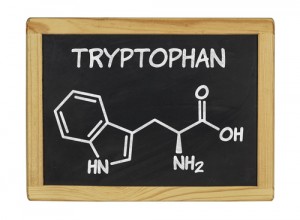Can Tryptophan Help Improve Memory in Multiple Sclerosis Patients?
Written by |

 Have you ever eaten a turkey dinner and afterwards someone says that the feeling of drowsiness is caused by the tryptophan in the meat? According to Texas A&M University Professor Dr. Nicolaas Deutz, “This story about tryptophan in turkey is just kind of a running joke, it has nothing to do with the tryptophan.” Sleepiness probably has more to do with eating a big meal, according to Deutz.
Have you ever eaten a turkey dinner and afterwards someone says that the feeling of drowsiness is caused by the tryptophan in the meat? According to Texas A&M University Professor Dr. Nicolaas Deutz, “This story about tryptophan in turkey is just kind of a running joke, it has nothing to do with the tryptophan.” Sleepiness probably has more to do with eating a big meal, according to Deutz.
It’s not that the amino acid can’t have potent effects on the central nervous system — it simply turns out that turkey does not have unusual levels of tryptophan. Tryptophan is normally converted to the neurotransmitter serotonin. Serotonin controls sleepiness, and higher levels of serotonin seem to improve mood.
While the fable of turkey making you tired might be a joke, using tryptophan to try to improve memory problems in people with multiple sclerosis, however, is far from funny, according to Dr. Deutz. Funded by the Maastricht University Medical Center, he is studying tryptophan-enriched diets and their effect on both mood and cognition in people with the de-myelinating autoimmune disorder.
Deutz and his colleagues at Texas A&M’s Center for Translational Research in Aging and Longevity (CTRAL) have studied tryptophan depletion for several years. They have found that both memory and cognition are adversely impaired when people do not get enough tryptophan. Using brain imaging, they saw less activity in an area of the brain responsible for memory encoding — called the hippocampus — when people lacked tryptophan. In a separate study in women, they saw that mood also became worse in people with a family history of depression.
[adrotate group=”4″]
 Because of these effects of tryptophan depletion, Deutz decided to try giving older people with multiple sclerosis tryptophan. He noted that although the onset of multiple sclerosis is during age 20-50, older people with the disease have particular problems with cognition and depression. He noted, “In many ways, multiple sclerosis is almost like the brain getting older on its own. The memory problems really look similar to dementia, Parkinson’s and other diseases that affect older people.”
Because of these effects of tryptophan depletion, Deutz decided to try giving older people with multiple sclerosis tryptophan. He noted that although the onset of multiple sclerosis is during age 20-50, older people with the disease have particular problems with cognition and depression. He noted, “In many ways, multiple sclerosis is almost like the brain getting older on its own. The memory problems really look similar to dementia, Parkinson’s and other diseases that affect older people.”
Previous studies of tryptophan supplementation were limited by a toxic byproduct. According to the investigators of the current trial, tryptophan can now be supplied in a non-toxic form as a component of different natural proteins.
“This research has been around for nearly 30 or 40 years,” said Deutz. “What makes it new is finally bringing it to a translational/clinical level and having a practical application. We now have more tools to measure metabolism and safer ways to digest large amounts of tryptophan.”
Those interested in participating in the study can visit the website: ctral.org/participate.


